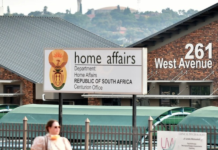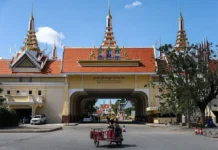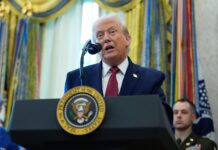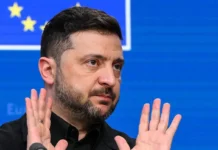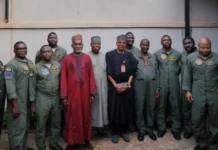President Donald Trump announced “big progress” after unexpectedly engaging in early discussions with a Japanese trade delegation in Washington on Wednesday.
These talks centered around the tariffs he imposed on global imports, an issue that has caused turbulence in financial markets and raised fears of a potential recession.
Japan, which has been one of the first countries to initiate formal negotiations, is seen as a key test of the U.S.’s willingness to compromise on these duties. Trump’s announcement came via a brief social media post: “A Great Honor to have just met with the Japanese Delegation on Trade. Big Progress!” However, no specific details about the conversation were shared.
At the table with Trump was Ryosei Akazawa, a close ally of Japanese Prime Minister Shigeru Ishiba. Akazawa, who recently took on the role of economic revitalization minister, was tasked with leading Japan’s delegation. According to sources familiar with Japan’s plans, they had not expected Trump to join the meeting, which they viewed as an informational session. Tokyo had hoped to focus primarily on trade and investment, not on broader policy issues.
After the talks, Akazawa spoke to reporters but offered few details. He did confirm that both sides agreed to meet again later this month, with Trump emphasizing that securing a deal with Japan was a “top priority.” Akazawa also noted that the issue of exchange rates, which the Trump administration has criticized as a tool for trade manipulation, was not discussed. Following Akazawa’s remarks on currency, the U.S. dollar rose by approximately 0.5% against the yen. Japan has consistently denied accusations of intentionally weakening its currency.
The meeting also included high-level officials from the U.S. government, such as Treasury Secretary Scott Bessent, Commerce Secretary Howard Lutnick, and U.S. Trade Representative Jamieson Greer, along with representatives from Japan’s ministries of trade, finance, and foreign affairs.
In Tokyo, Prime Minister Ishiba struck a more cautious note, acknowledging that negotiations would be difficult. “The negotiations will not be easy going forward, but President Trump has stated that he wants to prioritize talks with Japan,” Ishiba said in a statement after the meeting.
Meanwhile, Italian Prime Minister Giorgia Meloni is set to meet with Trump on Thursday to discuss tariffs on the European Union, and Bessent has invited South Korea’s finance minister for talks next week.
Trump has frequently criticized the U.S. trade deficit with Japan and other countries, arguing that American businesses have been exploited by unfair trade practices and countries intentionally keeping their currencies weak. Japan has faced a 24% tariff on its exports to the U.S., although these have been temporarily suspended for 90 days. However, a 10% universal tariff remains in effect, as well as a 25% levy on cars, which are a major export for Japan.
Bessent has previously noted the “first mover advantage” in these negotiations, citing that more than 75 countries have expressed interest in talks since Trump announced sweeping tariffs earlier this month. Trump also mentioned that the issue of Japan’s financial contribution to hosting U.S. troops in the country would be part of Wednesday’s discussions. Akazawa, however, declined to comment on this matter.
Japan’s representatives have made it clear that they strongly oppose the tariffs and are hoping to reach an agreement within the 90-day window. Bessent has expressed his desire for a comprehensive deal that addresses tariffs, non-tariff barriers, and exchange rate policies, although Japan has pushed to separate currency issues from the broader trade talks.
Earlier this month, Trump criticized Japan’s 700% tariff on rice, a claim that Tokyo disputes. The auto tariffs are particularly painful for Japan, as vehicles make up nearly a third of its exports to the U.S., its largest market. Japan hopes that increased investment in the U.S. might help mitigate some of the effects of these tariffs. For example, a potential multi-billion-dollar gas project in Alaska could be a point of negotiation, according to Bessent.
Tobias Harris, a political risk advisor at Japan Foresight, speculated that the Trump administration’s desire for a quick deal might lead to a less substantive agreement. “If the U.S. pushes for major changes in agriculture or auto regulations, the talks could become much more contentious and harder to conclude quickly,” he said.
REF: REUTERS










